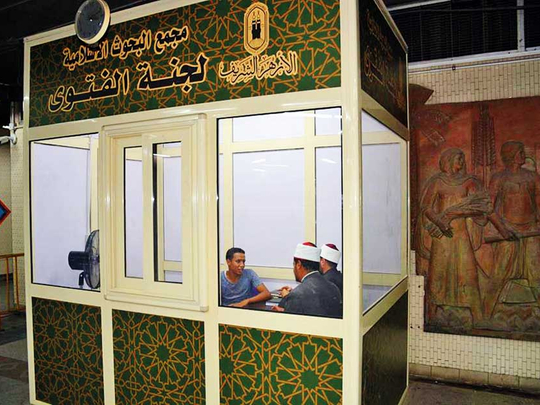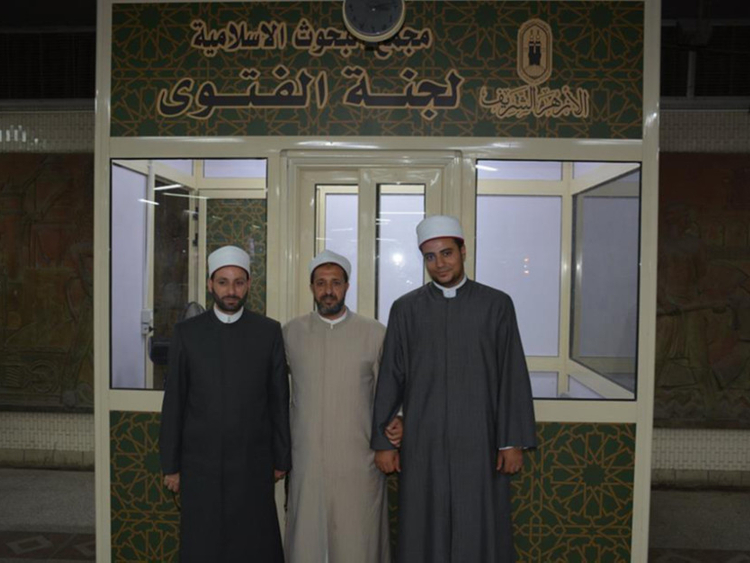
Cairo: Having just got off a packed metro train at the main station of the Cairo Underground system, Ahmad Al Sharqawi heads to an office in the vicinity. Inside the glass-panelled office sit two men clad in Muslim clerics’ distinct outfits.
Minutes later, Al Sharqawi, a household appliance trader, emerges with a beaming face.
“For long, I wanted to go to Al Azhar or Dar Al Ifta to ask for Islam’s opinion on the instalment system in trade,” the 52-year-old Muslim merchant says, referring to Egypt’s two leading Islamic authorities.
“But I was too busy to go to their headquarters. Now, the problem has been solved after this kiosk has opened here,” adds Al Sharqawi, pointing to the office carrying a sign on the facade, reading: the Committee of Fatwa (a religious edict).
“Some people previously told me that sale based on the instalment system, which entails higher prices than the cash sale, is haram [prohibited in Islam], but one shaikh inside the fatwa kiosk reassured me that such dealing is halal [permissible],” he says with a grin.
Al Sharqawi is one of dozens of Muslims, who have sought advice from the service since it started in mid-July at the Ramsis subway station in central Cairo. The service is available for 11 hours a day and provided by clerics from Al Azhar, Egypt’s prestigious Islamic centre of learning.
Clerics manning the service are satisfied with the public response.
“Different people, old and young, men and women, have come and asked for fatwas on different issues,” says Shaikh Mohammad Abuda. “Most questions are related to family problems. We have also received questions about financial dealings, atheism, divorce and inheritance,” he told Gulf News.
“If we receive a query for which we have no clear answer, we write down the person’s name and phone number in order to contact him later after getting the correct opinion from the Central Fatwa Committee. We cannot be like others, who issue fatwas without knowledge. We are here in order to fight misleading fatwas.”
Egypt has pursued a relentless crackdown on militants in the mostly Muslim country since the army’s 2013 overthrow of Islamist president Mohammad Mursi following enormous protests against his rule.
Authorities have since tightened their grip on mosques across the country, denying Mursi’s now-banned Brotherhood and allied groups a main forum to influence devout Muslims.
The clampdown has also resulted in removing books promoting radicalism.
Since Mursi’s toppling, Egypt has seen a spate of fatal attacks mainly targeting security forces and the country’s Christian minority.
The fatwa office at the Ramsis subway station is the first in such facilities planned to be set up at other stations, according to Al Azhar officials. More than 3 million people are estimated to use the Cairo subway system on a daily basis.
“The aim of the Fatwa Committee at the Metro stations is to reach as many citizens as possible in order to spread correct religious concepts and counter radical thinking,” said Mohieddin Afifi, the head of Al Alzhar’s Islamic Research Centre that is in charge of the project.
“This service, which is offered for free, is meant to help citizens, who do not have the time to go to Al Azhar or Dar Al Ifta. The service is also aimed at exposing fake preachers, who kill and bomb people in the name of religion,” he added in media remarks.
“This experiment strengthens Al Azhar presence. Religious work should be pursued in the street in order to bear fruit.”
In May, Islamic authorities launched religious broadcasts on the subway’s radio service.
Some commentators are critical of the religious activities at the subway stations. One of them is Durya Sharaf Eddin, an ex-information minister.
“The Underground stations are not the appropriate places to provide religious lessons and fatwas,” Sharaf Eddin recently wrote in private newspaper Al Masry Al Youm.
“I visited most metro stations around the world and I didn’t find a single religious radio or a cleric preaching. I only heard [there] audio instructions about passengers’ safety and schedules of train journeys,” she added.
“The metro should not become a mosque. If we don’t object to this, this bizarre practice may be extended to Cairo airport.”













